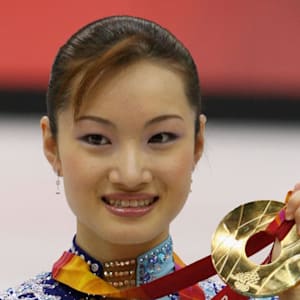Shizuka ARAKAWA
Biografia
Early beginnings
Very quickly, Arakawa developed a passion for skating, and she decided to sacrifice all her free time to training. At the age of eight, she was already able to perform a triple salchow. The young girl from Japan thus won five editions of the national championships, three times as a junior and twice as a senior. In 1998 in Nagano, Shizuka participated for the first time in the Olympic Games, at the tender age of 16. Japan had high hopes for her. The Emperor and Empress of Japan even came to see her performance in the competition, which she finished in thirteenth place.
Success away from the Olympic Games
Four years later, she was not present at the Salt Lake City Games. The skater finished second in her national championships and was not included in the Japanese Olympic team. In spite of this, Arakawa was successful in other championships, such as the Four Continents and NHK Trophy. In 2004 in Dortmund, she became women’s world figure skating champion.
The comeback after almost giving up
In 2006, after a year-long period in which she almost ended her career, Shizuka Arakawa took part in the Turin Olympic Games. A new coach and a new programme brought out a new, invigorated skater. The short programme was a real wager for the Japanese skater. She performed a noteworthy sequence to Chopin’s “Fantasie Impromptu”, finishing third, neck-and-neck with the two favourites, Sacha Cohen and Irina Slutskaya. They were only 0.7 of a point apart.
Japan’s first gold medal in figure skating
On 23 February 2006, she performed a perfect long programme. Accompanied by Puccini’s “Fantasy for Violin”, she performed a splendid Ina Bauer, her characteristic figure. Her programme was marked by simplicity and by the perfect control she had of it. She played it safe, however, and left out some of the figures planned, a choice which would end up being worthwhile. At the same time, her two direct rivals fell and were relegated to second and third place. Shiizuka obtained a score of 191.34, gaining herself the top step of the winner’s podium in Turin. Thanks to this performance, she took back the only Japanese medal from these Games: the first one in figure skating since Midori Ito’s silver medal at the Albertville Games in 1992, and Japan’s first gold medal in figure skating.
In primo piano
Shizuka ARAKAWA
Replay
Risultati Olimpici
Athlete Olympic Results Content
You may like

